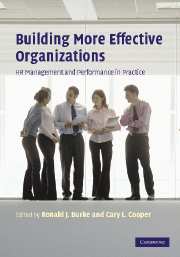Book contents
Foreword
Published online by Cambridge University Press: 05 June 2012
Summary
Building more effective organizations
The literature about organizations seems a growth industry with courses proliferating on the subject in business schools. Academic writing about the subject is only outdone by practitioners of the art of organizational analysis and change. The focal unit in any study of organizations varies depending upon the academic preparation or the experience of the theorist, researcher or practitioner. In the West, studies focused on patterns of growth and development until the middle and late 1970's when declining organizations were also recognized. The key questions have evolved from early descriptive studies of structure to studies of cycles in organizational effectiveness and then to component operations, resource utilization and functioning teams.
The field now includes theorists, researchers or practitioners out of engineering, sociology, political science and behavioral studies, each with their own brand of jargon. In this volume, the focus is on human organizations and the issues that arise from the time the organization is formed to the time it ceases to exist. As with every attempt to understand, study, and improve upon that on which one focuses, the process of analogy is a foundational tool of the writers. When the editors set the writers the task, of collecting innovative ideas about building more effective organizations. Regardless of their own academic discipline they focused on identifying ways to improve qualitative or quantitative performance within an organization's boundaries. Regardless of the orientation or background of the writer, certain characteristics are related to successful functioning.
- Type
- Chapter
- Information
- Building More Effective OrganizationsHR Management and Performance in Practice, pp. xii - xivPublisher: Cambridge University PressPrint publication year: 2007



